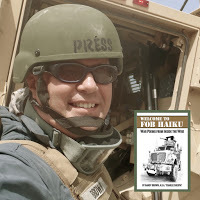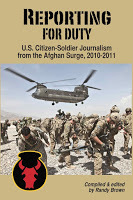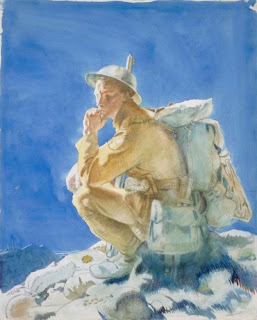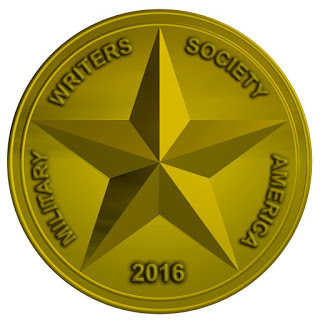Randy Brown's Blog, page 8
March 1, 2017
War Poet to Speak at DMACC-Boone
 Helping to raise funds for veterans charities via the "In My Boots 5K" student organization, 21st century war poet and Central Iowa journalist Randy Brown will present words, pictures, and lessons-learned from a 2010-2011 deployment to Afghanistan 7 p.m., Thurs., March 30, on the Des Moines Community College (DMACC) campus in Boone, Iowa. The public is invited.
Helping to raise funds for veterans charities via the "In My Boots 5K" student organization, 21st century war poet and Central Iowa journalist Randy Brown will present words, pictures, and lessons-learned from a 2010-2011 deployment to Afghanistan 7 p.m., Thurs., March 30, on the Des Moines Community College (DMACC) campus in Boone, Iowa. The public is invited. "Des Moines Community College has a history of helping Iowans put knowledge, experience, and service together in creative ways," says Brown. "I'm hoping to share how and why our citizen-soldiers made history in Afghanistan, and how we can engage each other in conversations and stories about war.
"Des Moines Community College has a history of helping Iowans put knowledge, experience, and service together in creative ways," says Brown. "I'm hoping to share how and why our citizen-soldiers made history in Afghanistan, and how we can engage each other in conversations and stories about war.A freewill-donation spaghetti supper will start at 6 p.m., with Brown's presentation to follow in the college's auditorium at 7 p.m. A number of related books will be offered as door prizes, as well as for purchase.
In 2009, Brown started blogging as a deploying citizen-soldier, writing under the pseudonym "Charlie Sherpa" about his family's experiences in preparing for war. The 2010-2011 deployment of Iowa's 2nd Brigade Combat Team, 34th Infantry "Red Bull" Division was billed as the largest call-up of Iowa troops since World War II. The 2-34th BCT is headquartered in Boone, with battalion and company headquarters located across the state.
 When he was dropped off the deployment list just days from federal mobilization in 2010, Brown retired from the military and then went to Afghanistan anyway, embedding as civilian media with his former "Red Bull" colleagues.
When he was dropped off the deployment list just days from federal mobilization in 2010, Brown retired from the military and then went to Afghanistan anyway, embedding as civilian media with his former "Red Bull" colleagues.Brown is author of 2015's "Welcome to FOB Haiku," an award-winning collection of often-humorous war poetry; and editor of the recently published "Reporting for Duty," a 668-page collection of journalism generated by the 2-34th BCT while deployed to Afghanistan. He is also a former cast member of "Telling: Des Moines," a veterans' storytelling performance that was staged at DMACC-Ankeny campus in 2012.
The annual "In My Boots" 5K walk, run, and ruck event annually raises funds for veterans-related charities. This year, proceeds will be directed toward Paws & Effect, a Central Iowa non-profit that raises and trains psychiatric service dogs for military veterans and others. The 2017 "In My Boots" event will take place April 15 in Boone's McHose Park. On-line registration is available here.
DMACC-Boone's Phi Theta Kappa Honor Society chapter will also be holding a food drive during the race.
A Facebook page for the "In My Boots" student organization is here.
A Facebook event page for the March 30 event is here.
For information, contact:
Jared Neal, president, "In My Boots" student group: jdneal AT dmacc DOT eduJulie Roosa: 515.433.5215; jkroosa AT dmacc DOT eduNancy Woods: 515.433.5061; nawoods AT dmacc DOT eduSean Taylor: astaylor AT dmacc DOT eduTo make on-line monetary donations to "In My Boots," visit here.

Published on March 01, 2017 03:00
February 1, 2017
'Best Defense' Blog: Pro-Tips in Haiku Form
 The Thinker on the Butte de Warlencourt,
The Thinker on the Butte de Warlencourt, watercolor, 1917, William OrpenThe Pulitzer Prize-winning Tom Ricks, who writes the "Best Defense" blog for Foreign Policy magazine and who has been a long-time supporter of the Red Bull Rising blog, is currently running a micro-essay contest (150-word maximum) on the theme: "What should a military professional profess?"
"It isn’t as easy as it sounds," he writes. "It can’t be just 'patriotic,' because it should have application to the militaries of other countries. […] I’m asking this now because I suspect we will see some tests of military professionalism in the coming weeks and months."
Read his full pitch here.
The contest, which is likely only for professional-bragging points, will run through the end of February. Any "winners" (defined as the "best or at least most interesting") will be posted in March. In the meantime, Ricks is occasionally featuring responses he's received so far. You know, to help people get the creative juices flowing.
Those familiar with my work in the award-winnng collection "Welcome to FOB Haiku" will not be surprised that my own attempt to address Ricks' question was a series of pithy, Japanese-style poems.
One of my favorites:
Your moral compassYou can read them all here on Ricks' blog.
should be red-light readable
for work in the dark.
Send your own micro-essay entries to: ricksblogcomment AT gmail.com

Published on February 01, 2017 03:00
January 4, 2017
MWSA Gold Medal Awarded to 'FOB Haiku'!
 Book reviewers at Military Writers Society of America (M.W.S.A.) recently announced that "Welcome to FOB Haiku: War Poetry from Inside the Wire" (Middle West Press, LLC) has been awarded a 2016 Gold Medal in Poetry.
Book reviewers at Military Writers Society of America (M.W.S.A.) recently announced that "Welcome to FOB Haiku: War Poetry from Inside the Wire" (Middle West Press, LLC) has been awarded a 2016 Gold Medal in Poetry.The award takes place after a 2015 MWSA rules revision. Under a new system, panels of three judges considered approximately 80 military-themed or -authored fiction, non-fiction, poetry, and other literature. According to the association: "The already stringent requirements were toughened further. Three judges read every book submitted and scored them based on content, visual, style, and technical criteria. The three scores were then averaged. To receive a medal, a book had to reflect MWSA's exacting technical standards as well has a high total score."
In a companion review to the award, author and Gold Star mother Betsy Beard described "Welcome to FOB Haiku" as "fresh, profound, illuminating." She continues:
[T]his is a must-read poetry book. It logs the humor and joy as well as the pathos and tragedy that comes as a result of serving in the American military."Welcome to FOB Haiku" can be purchased via on-line booksellers such as Amazon, Barnes & Noble, and more. For more information, visit: www.fobhaiku.com
The poetry is divided into several sections titled Basic Issue, Getting Embed, FOB Haiku, Lessons Learned, and Homecoming. A final section titled Notes contains valuable definitions as well as pronunciations for the ever-present military acronyms. Information in this section is critical to the understanding of how the poetry is to be read, since many of us do not know how to pronounce DFAC or TOC. My advice is to read the notes for each section before you read the poetry in that section. I think it will deepen the experience as well as allow you to get the meter that the poet intended.
One poem in particular changed the way I think of my son's service in Iraq, where he was killed in action. "Hamlet in Afghanistan" enabled me to realize more than I had allowed myself to think that "nothing we can ever do will change that day in the village." Heartrending, but true.
Not everyone in America understands the military culture. But for those who lived it, this book will bring remembrance and affirmation. For those who are families and friends of service members, this book will help you gain new understanding of your loved ones. For those without experience in this field, you may end up with a fresh look at what it’s all about.

Published on January 04, 2017 03:00
August 3, 2016
Video Puts 'Night Vision' Poem in New Light
Originally posted on the Red Bull Rising blog here!
Inspired by the March 2011 air-assault "Operation Bull Whip," conducted in Eastern Afghanistan by the Iowa National Guard's 2nd Brigade Combat Team (B.C.T.), 34th Infantry "Red Bull" Division (2-34th BCT), the poem "Night Vision" first appeared in Waterwood Press' 2015 war-themed anthology "No, Achilles." A brief analysis of the work was mentioned in that book's introduction.
The poem is reprinted in my print and e-book anthology "Welcome to FOB Haiku: War Poems from Inside the Wire," from Middle West Press. It also appears on-line at Poets and War, where Stephen Sossaman writes, in part:
I know of no other poem from the war in Afghanistan as likely to be canonized in future high school curricula: the poem is accessible, apolitical, spoken from the point of view of an American soldier—and it illuminates what might be the central fact of the long American military operation in Afghanistan.In a recent artistic experiment, I combined an audio narration of "Night Vision" with U.S. Army photographs of Operation Bull Whip. Hopefully, the resulting 75-second video will provide another way for others to discover and access the work. Check it out in the embedded video, above in this blog-post!
This poem quietly shows the unreconcilable clash of cultures, languages, and levels of technology that have frustrated American military efforts in Afghanistan for 15 years.
Sophisticated technology (night vision goggles) gives Americans enough illumination to see the land immediately beneath the helicopter ramp, something the Afghans without that gear cannot see. But any American confidence that they can see the future of the war, or see and understand Afghan circumstances on the ground, is illusory.

Published on August 03, 2016 03:00
April 12, 2016
Listen Up, Maggots! It's National Poetry Month!
 PHOTO BY: U.S. Army Sgt. Ken ScarThis post, written by the author of "FOB Haiku: War Poems from Inside the Wire," originally appeared on the Red Bull Rising blog April 6, 2016.
PHOTO BY: U.S. Army Sgt. Ken ScarThis post, written by the author of "FOB Haiku: War Poems from Inside the Wire," originally appeared on the Red Bull Rising blog April 6, 2016.When packing for one of my first training experiences with the U.S. Army, back in the late 1980s, I knew that free time and footlocker space would be at a premium. I could live without luxuries like my Walkman cassette player for a few months. I also wanted to avoid avoid too much gruff from drill sergeants. So I stuffed a paperback copy of Shakespeare's "Henry V" into my left cargo pocket, wrapped in a plastic sandwich bag, as my sole entertainment.
If nothing else, I thought, I'd work on my memorization skills. ("Oh, for a muse of fire-guard duty …") Little did I realize that so much of my brain would already be filled, starting those summer months at Fort Knox, Ky., with the nursery rhymes of Uncle Sam. Training was full of poetry. Sometimes, it was profane. "This is my rifle, this is my gun!" Sometimes, it was pedagogical. "I will turn the tourniquet / to stop the flow / of the bright red blood." There were even times that it was nearly pathological. "What is the spirit of the bayonet?! / Kill! Kill! Kill!"
These basic phrases connected us new recruits to the yellow footprints of those who had stood here before, marched in our boots, squared the same corners, weathered the same abuses. Every time we moved, we were serenaded by sergeants. Counting cadence, calling cadence, bemoaning that Jody was back home, dating our women, drinking our beer. We learned our lines, our ranks, our patches, our places as much by tribal story-telling than by reading the effing field manual. Even our soldier humor was hand-me-down wisdom, tossed off like singsong hand grenades. Phrases like, "Don't call me 'sir' / I work for a living!" and "You were bet-ter off when you left! / You're right!"
Nobody's quite sure why April got the nod as National Poetry Month. I like to think that it's because of that line from T.S. Eliot's "The Wasteland": "April is the cruelest month." Because that sounds like the Army. Besides, in springtime, the thoughts of every warrior-poet lightly turns to baseball; showers that bring flowers ("If it ain't raining / it ain't training!"); and the start of fighting season in Afghanistan.
Poetry, I recognize, isn't every soldier's three cups of tea. Ever since I entertained my platoon mates with Prince Harry's inspiring St. Crispin's Day speech, however, I've enjoyed sneaking poetry into the conversation. Perhaps more soldiers would appreciate poetry, were they to realize the inherent poetics of military life:
Every time you go to war, you are engaged in a battle for narrative. Every deployment—individually as a soldier, or collectively as an Army or nation—is a story. Every story has a beginning, middle, and end. Every story is subject to vision, and revision. History isn't always written by the victors, but it is re-written by poets. Treat them well. Otherwise, they will cut you.
Every time you eat soup with a knife, you are wielding a metaphor. Every "boots on the ground," every "line in the sand," every Hollywood-style named operation ("Desert Shield"! "Desert Storm"! "Enduring Freedom"!) is a metaphor that shapes our understanding of a war and its objectives. If you don't understand the dangerous end of a metaphor, you shouldn't be issued one.
(There's also a corollary, and a warning: As missions change, so do metaphors. In other words, when a politician trots out a new metaphor for war, better check your six.)
Every poem is a fragment of intelligence, a piece in the puzzle. A poem can slow down time, describe a moment in lush and flushed detail. It can transport the reader to a different time, a different battlefield. Most importantly, a poem can describe the experience of military life and death through someone else's eyes—a spouse, a villager, a soldier, a journalist. Poetry, in short, is a training opportunity for empathy.
Soldiers like to say that the enemy gets a vote, so it's worth noting that the enemy writes poetry, too. Like reading doctrine and monitoring propaganda, reading an enemy's verse reveals motivations and values. Sun Tzu writes:
If you know the enemy and know yourself, you need not fear the result of a hundred battles. If you know yourself but not the enemy, for every victory gained you will also suffer a defeat. If you know neither the enemy nor yourself, you will succumb in every battle.Every time you quote a master, from Sun Tzu to Schwarzkopf, you are delivering aphorism. I liken the aphorism—a quotable-quote or maxim—to be akin to concise forms of poetry, such as haiku. In fact, in my expansive view, I think aphorisms should count as poetry. In the world of word craft, it can take as much effort to hone an effective aphorism than it does to write a 1,000-word essay. Aphorisms are laser-guided missiles, rather than carpet bombs. We should all spend our words more wisely.
Reading a few lines connects us to the thin red line of soldiers past, present, and future. Poetry puts us in the boots of those who have served before, hooks our chutes to a larger history and experience of war. The likes of Shakespeare's "band of brothers" speech, John McRae's "In Flanders Fields," and Rudyard Kipling's poem "Tommy" continue to speak to the experiences and sentiments of modern soldiers.
I am happy to report that more-contemporary war poets have continued the march.
Here's a quick list to probe the front lines of modern war poetry: From World War II, seek out Henry Reed's "The Naming of Parts." For a jolt of Vietnam Era parody, read Alan Farrell's "The Blaming of Parts." From the Iraq War, Brian Turner's "Here, Bullet." In this tight shot group, modern soldiers will no doubt recognize themselves, their tools, and their times. Here is industrial-grade boredom, an assembly line of war, punctuated with humor and grit, gunpowder and lead.
Want more? Check out print and on-line literary offerings from Veterans Writing Project's "O-Dark-Thirty" quarterly literary journal; Military Experience & the Arts' twice-annual "As You Were"; the "Line of Advance" journal; and Southeast Missouri State University's "Proud to Be: Writing by American Warriors" annual anthology series.
Finally, you can buy an pocket anthology of poetry, such as the Everyman's Library Pocket Poets edition of "War Poems" from Knopf, or Ebury's "Heroes: 100 Poems from the New Generation of War Poets." Stuff it in your left cargo pocket. Read a page a day as a secular devotional, a meditation on war. Or, pick a favorite poem, print it out, and post it on the wall of your fighting position or office cube. Read the same poem, over and over again, during the course of a few weeks. See how it changes. See how it changes in you.
Remember: It's National Poetry Month. And every time you read a war poem, an angel gets its Airborne wings.
*****
Randy Brown embedded with his former Iowa Army National Guard unit as a civilian journalist in Afghanistan, May-June 2011. He authored the poetry collection Welcome to FOB Haiku: War Poems from Inside the Wire (Middle West Press, 2015). He is the current poetry editor of Military Experience and the Arts' "As You Were" literary journal, and a member of the Military Writers Guild. As "Charlie Sherpa," he blogs about military culture at: www.redbullrising.com.

Published on April 12, 2016 03:00
February 9, 2016
M.W.R. Haiku No. 5
Published on February 09, 2016 03:00
February 4, 2016
M.W.R. Haiku No. 4
Published on February 04, 2016 03:00
February 2, 2016
M.W.R. Haiku No. 3
Published on February 02, 2016 03:00
January 28, 2016
M.W.R. Haiku No. 2
Published on January 28, 2016 03:00
January 26, 2016
M.W.R. Haiku No. 1
Published on January 26, 2016 03:00













